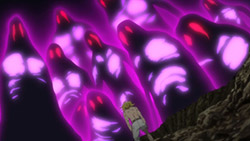 |
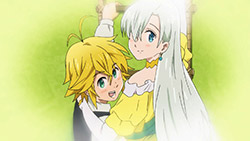 |
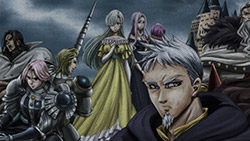 |
 |
 |
 |
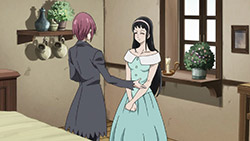 |
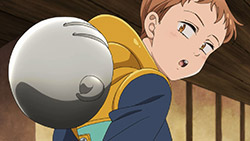 |
 |
 |
 |
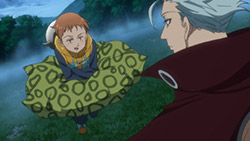 |
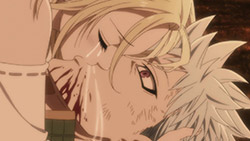 |
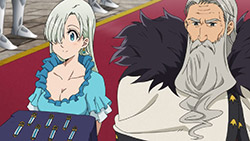 |
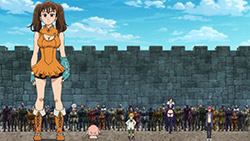 |
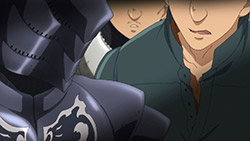 |
 |
 |
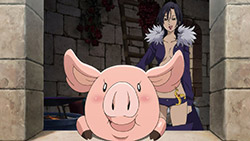 |
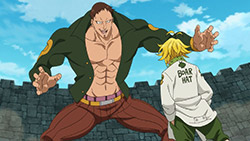 |
 |
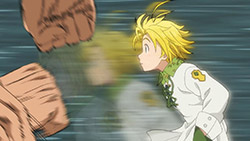 |
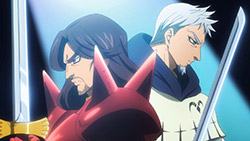 |
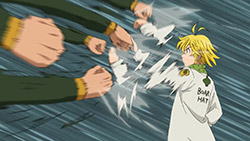 |
 |
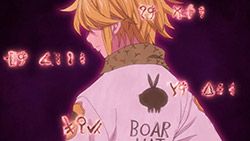 |
 |
 |
 |
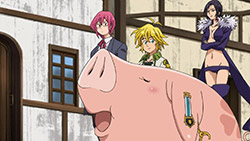 |
 |
 |
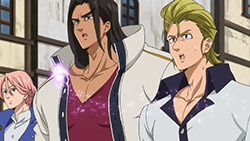 |
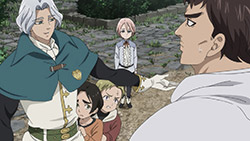 |
 |
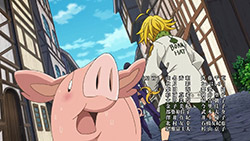 |
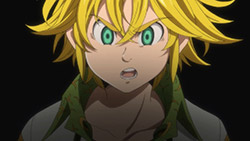 |
 |
 |
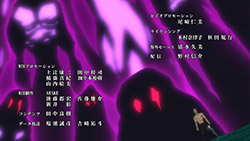 |
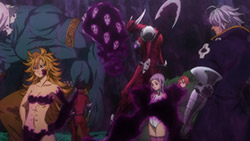 |
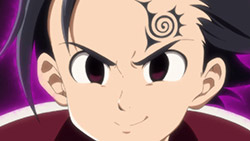 |
「魔神族復活」 (Majin-zoku Fukkatsu)
“Revival of the Demon Clan”
I’ve been waiting for Nanatsu no Taizai to return more than I ever expected when the first series ended. It’s one of those stories that’s just so rock solid that you don’t realize what you’re missing until it’s gone. If you want to hear more of my thoughts on this series in general, read my preview of it if you haven’t already. I gush a bit, and I’ll try to avoid repeating myself here. Instead, let’s talk about what this episode does well, and not as well, in starting up the next arc.
As I was watching this episode, I was put off by the revelation that Elizabeth (Amamiya Sora) running off with the Sins to Camelot was all a dream. That’s among my least favorite plot devices, and it’s something that needs to be integrated into the story at a fundamental level to make it work—and even then, it better not be used to punk the audience. Here, that’s not what was done. It was jarring. But then I remembered what manga readers said about the previous season’s finale, and I’ll just quote commenter Marx from that post:
The ending worries me if ever a second season comes as a lot of it has deviated from the manga. Explanations all that would have to be made and transition may be difficult. I can see a future for this show and hopefully the studio handling it can make a good transition into a possible new season.
In light of that, the “Just kidding, it was all a dream lolol!” reveal makes total sense. It’s not great, but I really liked the ending of the last season, it left us off on a really good note, and if this is the price we had to eventually pay to have that ending, I’ll pay it gladly. It’s far more important to me—and to storytellers who want to make sure people remember their work fondly enough to pick up the sequel—to end on a strong note, so I can live with a slightly wonky first episode. Once I remember that was what was going on, this episode worked much better, so anime-only viewers: that’s what’s happening. Roll with it.
Most of the rest of the episode was about getting back on track, and I’ll admit to stumbling a few times as they referenced events that I didn’t totally remember. If you didn’t watch the 00 recap episode, and it’s been a while for you too, I highly suggest it, though it’s not like a 24-minute recap episode can encompass everything in that happened in a 2-cour series. The best thing about this episode was undoubtedly that we got to see all these amazing characters again, from Meliodas (Kaji Yuki) whooping up on an uppity fool to Ban (Suzuki Tatsuhisa) showing that deep caring that keeps him from being an utter bully, to Diane (Yuuki Aoi) expressing sadness that King (Fukuyama Jun) left without telling her anything, because I’m still shipping them SO HARD! Also, Hawk (Kuno Misaki) played a huge role in this episode, and isn’t it kind of crazy how a mascot character with all of the prerequisites to be super annoying, well, isn’t? YMMV of course, but for me it’s that unfounded confidence and the indulgence with which all the sins treat him. Hawk just works.
The one element I’m apprehensive about is the introduction of power levels. I trust original creator Suzuki Nakaba, he’s proven his mettle so far, but here’s where I trot out that ol’ fact that I write fantasy fiction as well, and tell you that I once considered implementing power levels in my own books, and decided against it. Why? It has a lot to do with the speed of plot (trope!). Books, movies, and manga/anime have an advantage over media like video or board games, and it’s precisely because we don’t have to nail down the specifics. We can operate in a more relational way, i.e. saything that Meliodas has more spirit, Merlin has more magic, and Diane has more strength is totally fine, and something that was already clear from the story so far. What becomes difficult is when you start assigning specific numbers to these values, because it makes it much more likely that you’ll paint yourself into a corner. Take that trope I linked above: if you set it so that the hero’s vehicle travels at 60 units per hour fast, and a bomb is going to explode in 10 minutes in another city, and that city is 30 units away, your hero can’t make it, and you may have to rearrange your plot (or even retcon previous works!) around numbers rather than focusing on what would be the most interesting thing to happen. That’s backasswards. Instead, it’s usually better to only assign specific numbers when they’ll increase the tension (such as the bomb’s countdown timer).
The wise thing that Suzuki-sensei did was note that power levels can change and grow, not only over time but based on “various situations, affinities, and conditions.” That’s good, and the only thing that can make this work, because they become more of guidelines as opposed to absolute truths. In my own book series, I decided that my version of power levels—mana pool size—is largely static at birth, so it’s mostly about using it efficiently or effectively—but had I done that and then started assigning numbers to each character, I would have screwed up eventually and written myself into a corner. That’s why I needed the flexibility that relational, descriptive power levels provides. Suzuki-sensei has built that flexibility in so that he can still use numbers and has room to wiggle, but I dunno. I fail to see the point. Numbers are impersonal, and we already understood that the Sins were more powerful than the other Holy Knights, and they did a fine job of showing their power in comparison to their adversaries all throughout the first two cours, so I don’t know what this is adding. The only small thing is that the different areas of expertise—magic, strength, and spirit—have been made explicit, but I’m not sure that’s worth devaluing power into an impersonal number.
Still, it probably won’t do much harm, if it does any. I just thought y’all might be interested in an inside point of view on how such a decision might be made, and the tradeoffs that Suzuki-sensei probably considered before implementing this element. For everything else, the Sins are back, and they’ve got some new enemies to battle. I can’t wait to see these titans smash into each other, woohoo!
Random thoughts:
- “Hey now, Ban. Keep your face as the only joke here, would you?” Hah! Love that dialogue, and the relationship between those two.
- I wonder if King would be so happy that Ban thinks of Elaine if she were still alive. He’d be one helluva scoundrel to have as a brother-in-law.
My SECOND novel, Freelance Heroics, is available now! (Now in print!) (Also available: Firesign #1 Wage Slave Rebellion.) Sign up for my email list for updates. At stephenwgee.com, the latest post: The Last Jedi SUPER SPOILERY Review.
OP Sequence
 |
 |
 |
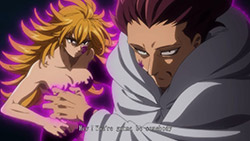 |
 |
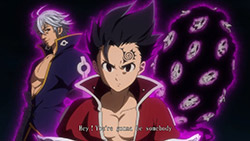 |
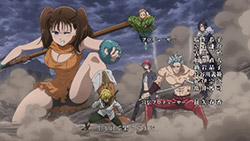 |
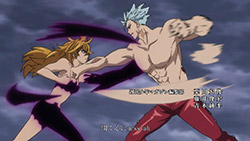 |
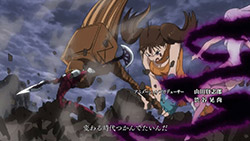 |
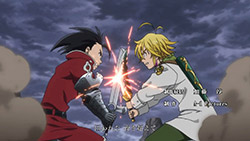 |
 |
 |
OP: 「Howling」 by FLOW x GRANRODEO
Omake
 |
 |
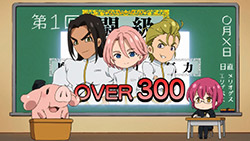 |
Preview
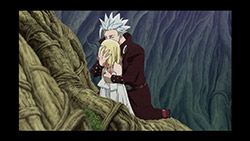 |
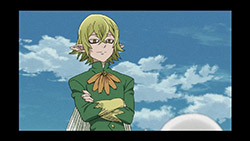 |
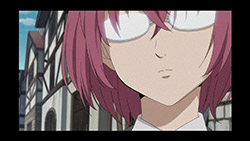 |
End Card
 |

Is this out on Netflix already, or, um… Available by other means?
Fansubs. I reccomend Tenshi
Indeed 24 episodes are already available on Netflix to watch.
24 eps confirmed for Nanatsu S2.
http://moetron.news/post/169640675540/nanatsu-no-taizai-imashime-no-fukkatsu-is
The question is whether S2 has enough time to cover the important parts, since last I heard the current 10 Commandments arc is still ongoing.
Has anyone confirmed the missing 7th deadly sin or is Elizabeth the 7th member now?
The 7th sin should appear in this arc.
Let’s just say the 7th sin is in one of these screenshots
Show Spoiler ▼
Don’t worry too much about the power levels, at least in the manga are used only sporadically and never in a DBZ way.
https://randomc.net/image/Nanatsu%20no%20Taizai/Nanatsu%20no%20Taizai%20Imashime%20no%20Fukkatsu%20-%2001%20-%20Large%2035.jpg
a naked copy of Obito from Naruto, just to be frankly
@Stilts Don’t mind the power levels. Let’s say it works like DBZ’s Saiyan Scouter where Goku’s power was shown 9000 on Nappa’s Scouter and when Goku used Kaioken, it showed 25000 on Vegeta’s Scouter. So it’s also possible the sins are suppressing/hiding their ki/power levels.
I hope you’re right! Like I said, I don’t think it’ll do too much damage—unless @Dalen is correct below *shudder*—though I still question its usefulness. Hopefully you’re right, or the anime dodges the whole issue anyway!
The power levels thing got really obnoxious in the manga right around this time. Like it was cute at first, but then it got more and more annoying. It’s like the author doubled down on stupid.
I’m happy there is finally more of the adventures of Hawk and his weakling fellow travel partners who can clean up all that enemy fodder for him. Only the leftovers matter after all.